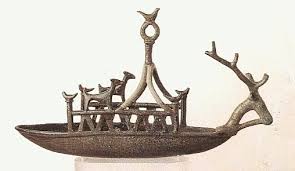Somewhere,
sometimes
Act Unique
in six scenes in Sardinian Language
By Ignazio
Salvatore Basile
Translaction
in to English by the same author
Characters
Itzocar Tribe’s
Chief of Nure- Brother to dead king Gonario
Irìsa His Wife
Damasu Son to
Itzocar and Irìsa
Gula
Daughter to Itzocar and Irìsa
Alàshia Sister
to Gonario
Aristea
Daughter to king Gonario’s sister , Alàshia
Nakigia Gonario ‘s
Widow and sister –in-law to Itzocar
Rumisu Nakigia’s
Son –Throne’s pretender
Bithia
Nakigia’s Sister - Priestess of
Nure
Iolao Bithia’s
Son
Anù High
Priest at Nure
Elki Anù’s
Son and
Soldier’s Chief
Soldiers
and People
King Gonario His Phantom
THE PLOT
On the tribe of
Nure reigns Itzocar, who rose in command twenty years before, when
his brother Gonario, suddenly died.
In so doing
Itzocar has however willfully ignored the rules regarding the succession
imposed by ancient tradition , who foresaw the Regency of Gonario’s widow, Nakigia, at least until the grown age of his
son Rumisu, still a child at the time of death of the king Gonario.
Trying to
legitimize and strengthen the usurped power Itzocar and authoritative Anù,
Member of the Council of elders of Nure, combine a double marriage: Damasu,
designed by his father Itzocar to succeed him on the throne, will marry Aristea
(who is daughter to deceased King's sister, Alàshia), while Elki, son of
Anù will marry Gula (daughter of Itzocar).
But
Nakigia, widow to Gonario, who is
contrary to weddings, invited to depose the gifts on behalf of Anù, invites the
nobles, priests and the people waiting for the awakening of Bithia Priestess (
mother of Iolaus), who has been doing the rite of incubation, waiting for a
forseen dream, to refuse the wedding at
least until Bithia’s reveil.
Rumisu, son
to deceased King Gonario and to Nakigia , aims to remove Uncle Itzocar in the
command , feeling empowered.
While
Nakigia exposes his call to wait, Bithia awakens and describes his dream of
doom: a Sun swallowed by the Moon(Song of Bitia).
Immediately after bursts on the scene Rumisu
accusing Uncle Itzocar to have usurped the command (song of Rumisu).
At the end
of Rumisu’s song, Damasu enters in
defense of his father Itzocar.
The two men
fight hand-to-hand.
The winner
will be Rumisu. The loser Damasu abandons the village.
Rumisu,
ripped the stick and the mantle from his uncle Itzocar, that will follow with
his wife Irìsa the defeated son, sits on the throne and invites Aristea to join
him at his side.
But Iolaus and Aristea announce their love.
And while the people and the guards, let the two lovers pass by, sadly Rumisu
will leave the scene defeated by his own lust for power.
The ghost
of King Gonario appears to underline the right rules with the song of Akinta Kamar.
When
Gonario goes out of scene, all the people will dance, celebrating the Last
Moon, before the sun takes over the power for ever.
FIRST SCENE
(the scene opens to the central square of the
nuragic village of Nure. In the background,
a sacred well of nuragic period and in the distance the towers of the
village; the half moon shines in the
blue sky; a mixed group are dancing a nuragic appropriate dance of good luck
wishing at the double promise of marriage between Damasu and Aristea and
between Elki and Gula.
The choir will be singing the following air)
Come on,
come on, lights from the sky
Come on,
bright and pregnant
Come to the
aiming water
Come on,
come on, lights from the sky
Itzocar
(standing up and beating the sheep’s stick for thrice, calling for silence)
- People of Shardana! Listen to me! I, Itzocar, King of
Nure, today I promise by the present
announcement the wedding of my son
Damasu with the nice princess
Aristea ((Aristea, will cover her
face with the veil; later on this sign,
soon interpreted as shyness, will be
revealed a gesture of refusing !)
And when the Moon is sank in the sacred well, nobody will be able to
deny this promise I’m doing in front of
you; I call everybody as witnesses as I
confirm the promise with the gifts that my wife
Irìsa will pose hereafter in the well;
Irìsa (she
stands solemnly up and goes to put the presents by the sacred well; then one
ancill will give her a veil whom with she will tie one the couples)
- You will be tied together for all your
life, in luckiness and sadness! For ever and ever!
Anù
(leaving the priest’s assembly will repeat the same Itzocar’s words, inviting
Nakigia, being him a widower, to deal the bribes)
- And I, Anù, Mayor between the Mayors
of Nure, announcing and pronouncing
the weddings of my son Elki with
the beloved king’s Itzocar daughter , the nice Gula(he will stare at Gula
who according to tradition will hide her own face with the veil) and
because I’m a widower it’s up to the first Priestess Nakigia to present the
gifts in front of the people!
Nakigia (
she will solemnly occupy the center stage, which will be promptly
released, but without taking any the gifts of Anù and leaving drop off the veil brought to
her for tieing the other couple ).
- Is not that the way we used to
present our weddings in the sacred well of Garlo in this country! Not even for
the ancient habits and not really while
our priestess Bithia is still consulting our Gods! (everybody
will turn towards the sacred tub of prediction where Bithia is staying, while
the heads and the priests shall lift buzz of discontent and protests; but the
protest stops while leaping from the
sacred cavern from which Bithia, cataplexy, comes, sustained by the vestals to occupy the center
stage and begins to sing)
1. to be continued...



